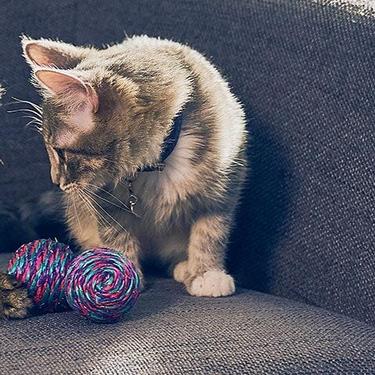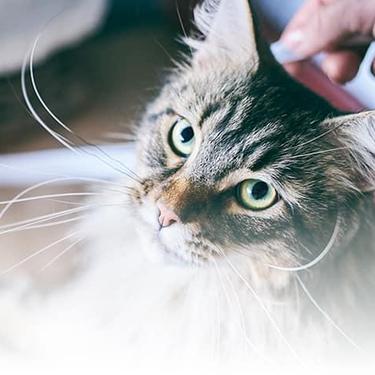
-
Find the right food for your petTake this quiz to see which food may be the best for your furry friend.Find the right food for your petTake this quiz to see which food may be the best for your furry friend.Featured products
 Sensitive Stomach & Skin Dog Food
Sensitive Stomach & Skin Dog FoodHill's Science Plan Sensitive Stomach & Skin Adult Wet Dog Food with Chicken is a complete premium dog food for adult dogs from 1 year. This savoury tinned loaf is enriched with ingredients that support digestive health & skin care.
Shop Now Perfect Weight Small & Mini Adult Dog Food
Perfect Weight Small & Mini Adult Dog FoodHill's Science Plan Adult Small & Mini Dog Food with Turkey is a complete premium pet food for adult small dogs from 1 year old that are prone to weight gain or slightly overweight. This deliciously smooth mousse is formulated to deliver the appropriate amount of energy to support weight maintenance in adult dogs.
Shop Now Perfect Digestion Small & Mini Adult Dog Food
Perfect Digestion Small & Mini Adult Dog FoodHill's Science Plan Perfect Digestion Small & Mini Adult Dog Food with Turkey is a complete premium pet food for small breed adult dogs aged 1–6 years. This deliciously smooth mousse is precisely balanced to deliver the appropriate amount of energy and to support digestive health in adult, small breed dogs.
Shop NowFeatured products Mature Adult Wet Cat Food with Chicken
Mature Adult Wet Cat Food with Chicken
Tender chicken chunks in gravy for mature adult cats. Made with easy-to-digest ingredients, high-quality protein for lean muscle maintenance and antioxidant vitamins C+E for optimal health.
Shop Now Light Adult Multipack Wet Cat Food with Chicken & Ocean Fish
Light Adult Multipack Wet Cat Food with Chicken & Ocean FishTender chicken chunks in gravy for cats, with L-carnitine and fewer calories for ideal weight management. Packed with high-quality protein, omega-6s, and vitamin E for shiny fur and healthy skin.
Shop Now Adult Multipack Wet Cat Food with Beef, Ocean Fish & Chicken
Adult Multipack Wet Cat Food with Beef, Ocean Fish & ChickenTender chunks in gravy for cats, with high-quality protein to maintain lean muscle. With vitamin E and omega-3s & -6s for healthy skin and balanced minerals to support healthy vital organs.
Shop Now -
Dog
- Dog Tips & Articles
-
Health Category
- Weight
- Food & Environmental Sensitivities
- Urinary
- Digestive
- Joint
- Kidney
-
Life Stage
- Puppy Nutrition
- Adult Nutrition
- Senior Nutrition
Cat- Cat Tips & Articles
-
Health Category
- Weight
- Skin & Food Sensitivities
- Urinary
- Digestive
- Kidney
-
Life Stage
- Kitten Nutrition
- Adult Nutrition
Featured articles Show some love with wet foods: a great choice for pets with health issues
Show some love with wet foods: a great choice for pets with health issuesShow some love with wet foods: a great choice for pets with health issues.
Read More The Incredible Science Behind Your Pet's Microbiome
The Incredible Science Behind Your Pet's MicrobiomeLearn what your pet's microbiome is, how it contributes to your pet's gut and overall health, and why nutrition is important in maintaining healthy microbiomes.
Read More The Right Diet For Your Pet
The Right Diet For Your PetIn people, the right diet is very important. If you are eating the wrong way for your metabolism, activity level, age and lifestyle you could end up with health issues.
Read More -


We all know that dogs can be taught basic commands, but what about your cat? Cats are not a social species like dogs, so they don’t appreciate praise in the same way dogs do. But as you already know, cats are highly intelligent animals, and they have the ability to learn a variety of behaviours.

How to train a kitten
It’s important to begin training your kitten as soon as possible so that they learn the rules of your home as they grow up. You don’t want your cat to be climbing your curtains, scratching your furniture, or constantly jumping up on the kitchen counter. Kitten training will help keep their mind and body active, teach good social skills and behaviours, and strengthen their bond with you.
Keep training sessions short, as kittens have short attention spans and can get bored easily. Focus on one command at a time during a session so that you don’t confuse them. Practise the commands in lots of different places around the house so that your kitten gets used to responding to you in different environments.
The easiest form of training is redirecting your kitten from unwanted behaviours. Have a variety of toys, and if your kitten starts doing something they’re not supposed to, redirect their attention to a toy. Having toys to play with will keep your kitten mentally and physically occupied (and less likely to be doing something they shouldn’t). You can also sprinkle them with catnip for further enticement to play.
Common cat behavioural problems
There are some common problematic cat behaviours that can be addressed through training, which will go a long way to strengthening the bond between you and your kitten.
- Furniture scratching.
- Aggression toward people or other animals.
- Fear of the cat box and vet visits.
- Difficulty with administering medication.


Tasty Tips
The right approach for training your kitten
One of the most common training techniques is positive reinforcement training, which is reward-based training. For instance, if you’d like to teach your kitten to sit, hold a treat near their nose, move it towards their forehead (so that their nose goes up and hopefully their bottom goes down), then let them have the treat as soon as their bottom touches the ground. After enough repetition, you can add a verbal cue, such as ‘sit’, as they sit down and soon your kitten will be able to do the behaviour when you give the cue. You can use positive reinforcement to help with other aspects of your kitten's training, such as teaching them to stand still for grooming and getting used to travelling by car.
If you’re lucky, your kitten will be willing and eager to learn. However, there’s a chance you’ll be ignored. Every kitten is different, and training can be a test to your patience. Carve out small amounts of time each day to spend on training. If you have other cats in your home, remember that they each have different personalities and may find different things rewarding.
Be aware that cats do not understand or respond well to punishment. Punishment will stress your kitten out and cause them to run away and hide from you, which can also breed behavioural and health problems. Encouraging good behaviour with a reward is much more effective, and that reward can come in the form of a head scratch, play with a special toy and/or a tasty treat. This reward-based training teaches your kitten to associate good behaviour with positive results.
How to address unwanted behaviour in your cat
There could be several reasons why your cat is acting out. They could be stressed over a new change in your home, have a medical condition, or simply not understand that the behaviour is unwanted. While you may think that your cat is misbehaving because they’re upset or being spiteful towards you, this is usually not the case. We need to remember that what many people call ‘bad behaviour’, like scratching, is actually normal cat behaviour. We can’t – and shouldn’t want to – remove many of these behaviours because they are innate and important for good welfare.
Redirecting the behaviour instead of punishing is more likely to get your kitten back on track. Punishing them may make them feel threatened by you, which can ultimately lead to even more stress and bad habits, and may damage your bond. You can redirect them to things you’d like them to do. For instance, if they are scratching the settee, gently move them to a scratching post and reward them if they scratch that instead. Always remember to praise your kitten for good behaviours as well. Give a treat for a job well done, and they will learn to associate those actions with rewards.
If you have any suspicion that a kitten’s unwanted behaviour is due to a medical condition, always seek prompt veterinary advice. Young and small animals can become ill more quickly than adults.


One of our staff authors prepared this article for you
Related products

Tender chicken chunks in gravy for cats, with L-carnitine and fewer calories for ideal weight management. Packed with high-quality protein, omega-6s, and vitamin E for shiny fur and healthy skin.


Tender chicken chunks in gravy for mature adult cats. Made with easy-to-digest ingredients, high-quality protein for lean muscle maintenance and antioxidant vitamins C+E for optimal health.

Tender chunks in gravy for cats, with high-quality protein to maintain lean muscle. With vitamin E and omega-3s & -6s for healthy skin and balanced minerals to support healthy vital organs.
Related articles

Kittens grow a lot in their first year, so it is important to provide them with the proper nutrients early, so they grow up healthy and strong. Learn more.

From essential vitamins & minerals to different types of meat, learn what to look for when choosing the best cat food for your feline.

Learn how to make homemade cat treats that are healthy for your pet with this recipe from Hills Pet Nutrition.

There are three common ways to feed a cat. Each way has its advantages and disadvantages.

Put your cat on a diet without them knowing
Our low calorie formula helps you control your cat's weight. It's packed with high-quality protein for building lean muscles, and made with purposeful ingredients for a flavourful, nutritious meal. Clinically proven antioxidants, Vitamin C+E, help promote a healthy immune system.
Put your cat on a diet without them knowing
Our low calorie formula helps you control your cat's weight. It's packed with high-quality protein for building lean muscles, and made with purposeful ingredients for a flavourful, nutritious meal. Clinically proven antioxidants, Vitamin C+E, help promote a healthy immune system.

